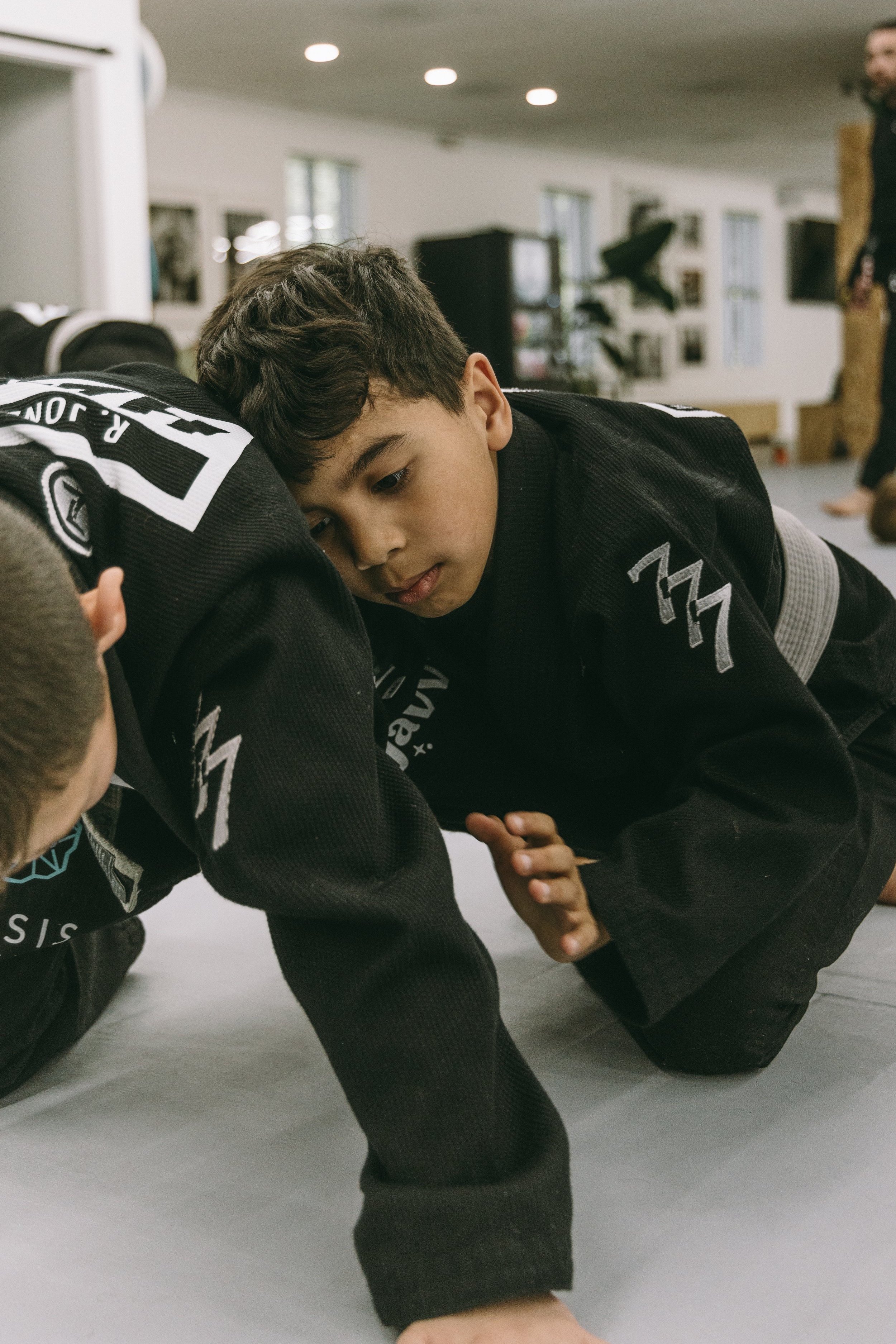Golden Years on the Mat: Practicing Jiu Jitsu After 50
In today’s world, where age isn’t a limitation, Brazilian Jiu Jitsu offers a transformative journey. For those over 50, this martial art combines workout, meditation, and strategic challenges. Jiu Jitsu emphasizes balance and technique, promoting self-discovery and purposeful living. It fosters community and camaraderie, transcending generational barriers and supporting mental health. Emphasizing technique and self-awareness, Jiu Jitsu ensures safety and combats age-related physical declines. This practice isn’t just about adding years, it’s about infusing life with vitality. So, if you're curious, give it a try and see what the mat has in store for you!
In today’s fast-paced world, where age is often misconstrued as a limitation, it’s crucial to challenge the narrative of decline with growth and vitality. For those over 50, Brazilian Jiu Jitsu emerges as an unexpected yet profoundly transformative journey. A marvellous testament to the adage, "the best is yet to come."
Why engage in Jiu Jitsu as you age? Let's dive into that. Imagine combining a workout, a meditation session, and a strategy game — all rolled into one afternoon on the mat. Jiu Jitsu provides this unique synergy, offering physical, mental, and emotional enrichment. Engaging in this martial art encourages the experienced adult to combine hope with practicality, a discipline of balance and technique, rather than raw strength.
The pursuit of mastery here is timeless, and therein lies a compelling persuasion: purpose. Researchers across disciplines agree that having a purpose is positively correlated with increased well-being and longevity. Jiu Jitsu becomes more than an exercise, it’s a path to self-discovery and meaningful living. A continual puzzle where learning and adaptability are at the forefront.
Now, consider the importance of community, a central pillar of the human experience. On the mat, camaraderie thrives, erasing generational barriers. Participants find a tribe that values growth, where you're greeted with the welcoming acknowledgment of a shared quest for betterment. This social aspect isn’t just heartwarming, it’s vital for mental health and combating the isolation that sometimes accompanies aging.
Regarding safety, rest assured that Jiu Jitsu is a controlled practice. Its emphasis on technique and self-awareness minimizes risks, making it a smart choice. Also, the discipline offers the essential exercise needed to fight age-related declines in physical health, such as flexibility, balance, and cardiovascular strength.
The decision to embrace Jiu Jitsu post-50 isn’t simply about adding years to life, it's about adding an exciting life to years.
So why wait any longer? Whether you're a seasoned practitioner or a curious beginner, embark on this transformation. Visit the Academy, witness the vitality, and shake the hand of your future self. Because in the grand scheme of life, adventure awaits those who dare to step on the mat.
Oss!
50 and Fearless: Tackling Jiu Jitsu with Wisdom and Strength
In a world that often suggests slowing down with age, John Beaver, Andy Selcer, and Mike Pilley redefine the narrative through Jiu Jitsu. Each, well past the age of 50, embraces the sport not just for its physical challenges but for its profound mental growth. John speaks of adaptability, Andy emphasizes skills, and Mike focuses on mental resilience. Together, they prove that this period of life is about nurturing passions with wisdom and strength. Jiu Jitsu becomes their dance of grace and power. Are you ready to redefine your own life's journey and embrace being 50 and fearless?
In the golden years, society often suggests we sit back and slow down. Yet, there stands a trio — John Beaver, Andy Selcer, and Mike Pilley — who dismiss this notion by diving into the world of Jiu Jitsu. Their story isn’t merely about combating physical limitations. It’s a journey of inner growth and courage.
John Beaver, age 65, epitomizes toughness. Despite being a late starter, John adapted the philosophy of adaptability in Jiu Jitsu to keep his mind sharp. In every challenge on the mats, John sees an opportunity to learn something new. His influence stretches beyond the mats, inspiring many to face life’s trials with a renewed perspective.
Then there’s Andy Selcer, a remarkable 75-year-young warrior. To him, age is but a number, and every grapple session is a chance to rewrite narratives. Andy encourages a focus on balance, strategy, and technique over brute force. “Jiu Jitsu is life,” Andy advises, “take it slow, learn with each movement, and appreciate the journey.”
Mike Pilley, at 57, exemplifies the fusion of wisdom and strength. His journey is about more than the physical, it’s about building mental resilience through the art of defense and leverage. “Jiu Jitsu teaches humility and patience,” Mike suggests, “it reminds us we can be strong and wise, no matter the miles on our bodies.”
It’s time to rewrite your own story. If they can conquer the rolling mats, channeling resilience, so can you. Life after 50 doesn’t mean pausing your passions, it means nurturing them with deeper insight. Jiu Jitsu, a dance between skills and strength, awaits you.
Embrace this phase with the courage of a warrior, wisdom, and the strength of your convictions. Ready to step onto the mat and prove that life’s battles are best fought with wisdom over worry?
Unroll a new chapter in your life and try a Jiu Jitsu class today. Rediscover the power of becoming 50 and fearless. Are you ready to meet your boldest self yet?
The Over-50 BJJ Revolution: Defying Age with Every Roll
The world of Brazilian Jiu Jitsu opens its doors to everyone, including those over 50, defying the assumption that age limits potential. It's a realm where leverage takes precedence over brute force and strategy over sheer strength. For those over 50, stepping onto the mat isn't about reliving the past but embracing the present. It's about challenging societal norms and reshaping their lives through purposeful movement and mental agility. With each roll, they discover empowerment and resilience. In a sport that champions community and lifelong learning, the mat becomes a space where every person, regardless of age, can thrive.
There lies within the heart of Brazilian Jiu Jitsu an enticing paradox: the art of leverage over muscle, of technique over brute force. Today, as the sport experiences global recognition, a surprising demographic is leading a quiet revolution: those over 50.
Is it just nostalgia? A harmless venture into youthful dreams? Hardly. For many, stepping onto the mat is more about resilience than reminiscing. It's about challenging society's narrative which says that age constraints limit our potential. Let me tell you a secret, they don’t.
When people over 50 roll on the mat, they aren’t just learning how to guard, pass, or sweep. They are subtly reshaping their lives. They are learning to tackle challenges with grace and strategy. They are becoming ambassadors of a message our society desperately needs: Your age is merely a number, not a barrier.
Consider the stories of pioneers like John Danaher, athletes pushing boundaries after 60, or women in their 50s finding newfound empowerment. Their secret? A community-driven learning model that BJJ fosters passionately. Peer support, expert mentorship, and a commitment to lifelong learning, these are the true levers of transformation.
For those over 50, stepping onto the mat should not be an exception but an expectation. The cognitive benefits of strategic thinking, the physical gains from regular movement, and the sheer joy of mastering technique bring clarity, health, and purpose back into the daily chaos of life.
The power of certainty comes from action. If there's any part of you hungry to challenge the narrative, or if you're just seeking the thrill of evolution, take that first, audacious step. Reach out to local BJJ schools, find fellow revolutionaries, and engage with this community. The mat is waiting, welcoming, and regardless of your age, your transformation is only a roll away.
Ask yourself, can you afford not to explore this opportunity to defy age and redefine possibility? Join the revolution today, because the best time to start was yesterday, and the next best time is now!
Silver Linings: How Jiu Jitsu Transforms Lives at 50 and Beyond
At 50, many see a time to slow down, but Jiu Jitsu offers a transformation path. This martial art emphasizes technique over strength, making it ideal for those leveraging life wisdom. Jiu Jitsu fosters resilience, mental acuity, and camaraderie, enhancing well-being and enriching lives. It's more than physical training; it’s a journey of self-discovery, pushing limits and redefining aging myths. Practitioners find renewed vitality and focus, often experiencing personal renewal. Embrace this new chapter, transcend limitations, and explore the transformative power of Jiu Jitsu to ignite a vibrant and purposeful life at 50 and beyond.
At 50, many believe it’s time to slow down but Jiu Jitsu offers a compelling alternative, a gateway to transformation and renewal.
Jiu Jitsu is more than just a martial art, it is a journey of self-discovery. This practice is known for building resilience and mental acuity, crucial for countering the myths of aging. Studies show that engaging in new physical activities stimulates brain function and enhances overall well-being. Jiu Jitsu embodies this principle, blending movement with mindfulness.
Rather than relying on brute strength, Jiu Jitsu emphasizes technique and strategy. It is a discipline where experience often outweighs youthful energy. This makes it uniquely fitting for those over 50, who can tap into a lifetime of wisdom to excel. Each training session is a lesson in patience and perseverance, cultivating inner strength and self-confidence.
The community aspect of Jiu Jitsu cannot be overstated. Practitioners become part of a vibrant network that fosters encouragement and growth. For many, this sense of camaraderie becomes a cornerstone of their training, creating friendships that transcend the academy and enrich lives.
As evidence of its transformative power, countless individuals have embraced Jiu Jitsu later in life with remarkable results. They report feeling more vibrant, focused, and resilient. The practice becomes a personal renaissance, a path to rediscover vitality and purpose.
Now is the time to redefine what life after 50 looks like. Don’t let age dictate the scope of your ambition. Experience firsthand the transformative power of Jiu Jitsu, and open the door to a stronger, wiser, and more connected life.
Take the first step. Enroll in a class and see how Jiu Jitsu can unlock your potential, illuminating every facet of your life at 50 and beyond.
It's Never Too Late: Embracing the BJJ Journey After 50
In a world enamored by youth, we often forget the untapped power lying in our later years. Brazilian Jiu Jitsu isn't just a sport, it's a pathway to rediscover strength and strategy, no matter your age. Embracing BJJ after 50 means tapping into the wisdom and patience that decades of experience bring. It's a personal evolution rather than a competition, a chance to redefine self-discovery and discipline. Don’t let age be a barrier. Let your legacy evolve with new challenges and inspire others by stepping onto the mats. It's never too late to begin. Join the movement today!
In a world where youth often steals the spotlight, it's easy to overlook the profound potential lying dormant in our later years. But the truth is, mastery and joy don't recognize age. Brazilian Jiu Jitsu embodies this wisdom to the core.
What if I told you that stepping onto the mats after 50 unlocks opportunities waiting just for you? Age isn’t a barrier but a badge of wisdom, a testament to experience, a mark of ready resilience. When you embrace BJJ post 50, you’re not merely learning self-defense, you're redefining self-discovery.
Imagine harnessing the power of a Sage. You’ve gained insights younger practitioners can only dream of. Sure, they might be faster, more agile but you carry the depth of patience and strategy.
This isn’t just a sport, it’s a philosophy. BJJ promotes humility, which you’ve already honed over decades. Your journey isn’t about proving something to the world, it’s about proving something to yourself. Accepting challenges, embracing vulnerability, and dancing with discipline.
Don't let inertia take over. Put on a gi, walk onto the mat, and join a community that values initiative above age. Your legacy starts with the first step, and continues step by step, evolving into a rhythm of courage.
Don’t wait for tomorrow, the time is now. Embrace the art, invite the discipline, enjoy the grind! Become a beacon for others, showing that life’s journey can still be purposeful after 50.
Let your future self look back with gratitude. The choice is here, ready to sculpt more than muscle. Join the BJJ movement and redefine your strength today!
Fatherhood and the Gi: Using BJJ to Foster Emotional and Physical Growth in Children
Fatherhood transcends provision, cultivating minds, nurturing confidence, and building resilience. Brazilian Jiu Jitsu transforms this journey. On the mat, children learn beyond martial arts. They gain trust, resilience, and courage. Fathers have a duty to instill discipline and emotional intelligence, and grow with their children. The Gi, emblematic of a father’s embrace, transforms mistakes into lessons and persistence into triumph. Fathers teach more than defense, they imbue children with self-awareness, confidence, and respect. Explore BJJ’s transformative power, fostering warriors with respect and kindness.
In the world of parenting, being a father goes beyond being just a provider. It’s about shaping young minds and nurturing confident, resilient individuals who can embrace life’s challenges. Meet Brazilian Jiu Jitsu, the unlikely hero that’s revolutionizing fatherhood.
Imagine your child on a BJJ mat. It’s not just learning how to fight, it’s about trust, resilience, and facing fear with courage. Brazilian Jiu Jitsu is more like a classroom. As fathers and mentors, it is your duty to instill discipline and emotional intelligence within their ever-curious minds.
Imagine the impact: fathers and kids, learning and growing together. The Gi isn’t just a uniform, it’s a symbol, like a father’s protective embrace. Within it lies a safe space where mistakes become lessons and where persistence shapes success.
If you, dear fathers, champion this journey, you’re not just teaching defense but gifting your children the power of self-awareness, confidence, and respect. You lead by example, showcasing emotional balance even amidst chaos. They, in turn, learn to move with grace, both on and off the mat.
This isn’t just about jiu-jitsu. It’s about embracing fatherhood’s calling to forge paths, not just follow them. It’s about cultivating warriors of respect and kindness, who carry these values through life’s challenges.
To fathers, mentors, protectors: join our mission at the academy. Witness how BJJ transforms children into resilient warriors filled with discipline and heart. Experience the profound impact of guiding their journey both on the mat and in life.
Fatherhood and Camaraderie: How BJJ Creates Bonding Opportunities While Building Kids’ Self-Worth
In a world filled with noise, BJJ offers a path for both body and soul. A journey where fatherhood finds a powerful ally. On the mat, you’re modeling patience, resilience, and the beauty of effort, building trust and understanding with your child. BJJ teaches life lessons: persistence, adaptation, and finding harmony in struggle, instilling self-worth through small victories. Authority here inspires respect through engagement, showing values of respect, discipline, and humility. It’s not about building warriors, it’s nurturing relationships and real-world resilience. Embrace this opportunity, create lasting memories, and start this transformative journey together. Discover the art and each other.
In a world filled with noise, where screens dominate and connections feel fast but shallow, the meaningful moments we crave are fewer but more precious. Enter Brazilian Jiu Jitsu, a path not just for the body but for the soul. A journey where fatherhood finds a powerful ally.
Imagine a place where you and your child become partners in growth. This is persuasion woven through action. On the mat, you aren’t just showing them techniques. You're modeling patience, resilience, and the beauty of effort. It’s in these shared experiences that you build not just skill, but profound trust and understanding.
Through the lens of stoicism, BJJ isn’t merely about grappling. It’s a reflection of life itself. It teaches us to persist, to adapt, and to find harmony in struggle. For your child, it’s a lesson in self-worth. Success here isn’t measured by medals or accolades but by the small victories, the quiet confidence that grows with every roll, every escape managed.
Authority is powerful, not when it demands compliance, but when it inspires respect. As a father on this martial journey, you lead not with words, but through engagement. You teach values of respect, discipline, and humility, not by preaching, but by practicing it.
Now, take a step into this transformative journey. Let’s create memories built on sweat, laughter, and learning. Visit our Academy, where you and your child can cultivate bonds that will thrive beyond the mats.
This isn’t just about building warriors. It’s about nurturing relationships, fostering real-world resilience, and shaping legacies. Step onto the mat, embrace this opportunity for deeper connection, and let’s start this journey together.
Discover the art. Discover each other. Join us today!
Empowered by Dad: How Fathers Use BJJ to Instill Confidence and Resilience in Their Kids
In the world of Brazilian Jiu Jitsu, fathers are redefining parenthood by guiding their children through a journey of empowerment and resilience. With each grapple and roll, kids learn the art of persistence, gaining confidence to tackle life's challenges. Fathers, stepping into the role of mentors, become the heroes their children look up to. BJJ is not just about physical strength, it’s a profound lesson in mental fortitude. Witness the transformation as timid souls find their voices and anxious hearts discover calm.
In the ever-evolving saga for parenting strategies, fathers are turning to Brazilian Jiu Jitsu to shape their children's futures. Not just physically, but mentally and emotionally as well. BJJ offers more than just self-defense, it's a philosophy of life.
Picture this: your child, excited yet hesitant, steps onto the mat for the first time. Feel the heart beating faster in anticipation as they join other young warriors starting on a journey of transformation. Here, confidence is not just built, it's forged in the hardship of challenge and perseverance.
Fathers, often seen as protectors and providers, become mentors as they support their kids through the challenges of combat, teaching them life's fundamental lesson: resilience. Through BJJ, children learn to pick themselves up after every fall, mastering the art of resilience. A skill forged from the chaos of the mat that echoes into every corner of life.
At the Academy, countless success stories emerge. A timid child finds their voice, an anxious soul discovers calmness amidst the storm. BJJ stands as a symbol of empowerment, backed by the authority of martial arts lineage and traditions that span generations. This is not just about techniques and moves, it’s a rite of passage designed to unlock potential.
As fathers lead by example, they quietly model the virtues of determination, respect, and discipline. How relevant that the very skills their children acquire through BJJ echo the qualities that society values and rewards.
Imagine the possibilities for your child. The confidence on and off the mat. The resilience to face any challenge life throws their way. Join us at our academy, where fathers mentor champions. Your child’s hero’s journey begins here. Visit us today, and be part of a legacy that shapes future leaders.
Are Fathers Forgetting to Teach Important Skills? How BJJ Helps Kids Be Strong and Speak Up!
In the maze of modern parenting, a crucial question comes up: Are fathers forgetting to prepare their children with essential skills? Brazilian Jiu Jitsu offers a transformative journey where young heroes are born. It’s not just a sport, it's life training, developing resilience, courage, and communication. Children learn perseverance and respect through grappling, embodying self-esteem and dynamic presence. The invitation is to unleash your child’s hero within at our academy. Witness their transformation as they learn to grapple not just with opponents, but with life’s challenges. This isn’t just an activity, it’s an investment in their future.
In the maze of modern parenting, a compelling question comes up: Are fathers forgetting to teach their children crucial skills? It's not merely about the tasks and techniques of the past but the virtues of courage, resilience, and the power to speak up.
Enter Brazilian Jiu Jitsu, a timeless art form and a modern-day arena where young heroes are born. BJJ is not just a sport, it’s a transformative journey, the hero’s path where children discover strength not just of the body but of the mind and spirit. Imagine your child stepping on the mat, their inner hero awakened, ready to innovate, becoming a champion of their own narrative.
Why BJJ? Because it is a testing ground where strengths are forged. Children learn perseverance through pressure, they develop a voice through the encouragement of peers and mentors, and they earn respect not by demanding it but by meritocracy. This isn’t just physical training, it’s life training, sparking growth that psychologists praise for fostering self-esteem and communication skills crucial in an ever-growing, connected world.
The social proof is evident. Look at the legions of successful individuals who credit BJJ with their self-mastery and dynamic presence. This resonance of community and discipline is often missing from the chaos of everyday life, where fathers perhaps forget, or perhaps aren't equipped, to teach such important skills.
Here’s the invitation: Let us help you unleash your child’s hero within by visiting our academy. Witness the transformation as your child learns not just to grapple with opponents but with life's challenges, growing stronger and more articulate with every class. This isn’t just an after-school activity, it’s an investment in your child’s future.
Join us and watch your child’s potential unfold. The journey begins with a single step, and it starts here, with us, with you.
Redefining Femininity: How BJJ Challenges and Changes Women’s Self-Perception
In Brazilian Jiu-Jitsu, women are reshaping femininity, blending strength and grace. Traditionally linked to gentleness, femininity now embraces empowerment through BJJ’s transformative journey. Women confront fears, boosting self-esteem and resilience. This art offers a supportive tribe, celebrating strength, discipline, and respect. Endorsed by many, it enhances mental clarity, physical strength, and emotional stability. Imagine stepping onto the mat, becoming your own hero.
Embrace change, grow stronger, and challenge yourself. Visit our academy, discover your inner power, and redefine femininity. Join us and become the warrior you were meant to be.
In the world of Brazilian Jiu-Jitsu, true strength often wears a different face. Many women are discovering this unique martial art, not just as a sport, but as a transformative journey into self-empowerment. BJJ redefines femininity by breaking stereotypes and reshaping self-perception.
Traditionally, femininity was linked to gentleness. Today, women worldwide are proving that strength and grace go hand in hand. BJJ is a tool for change, empowering women, and promoting confidence without losing femininity.
Through the lens of psychoanalysis, BJJ offers a dynamic space for women to confront fears and insecurities. By facing a stronger opponent, women learn resilience and grow in courage. This leads to greater self-esteem and a renewed sense of purpose.
Social proof shows us that more women are joining martial arts academies and reshaping narratives about women and fitness. They become role models, heroes to admire, standing tall and proud. In Brazilian Jiu-Jitsu, each woman finds her tribe. A community that celebrates strength, discipline, and respect.
Authority figures in the martial arts community endorse BJJ as both an effective self-defense mechanism and a life-altering practice. They attest to its benefits, mental clarity, physical strength, and emotional stability. Here, women discover their own version of Wonder Woman, blending toughness with empathy.
Now, imagine stepping onto the mat, feeling every fiber in your being stand ready, becoming the hero of your own story. This is your invitation to embrace change, to grow stronger, to challenge yourself in ways you never thought possible.
Visit our academy to start your journey in Brazilian Jiu-Jitsu. Discover the power within, embrace your strength, and redefine what it means to be beautiful.
Join us today and become the warrior you were always meant to be.
From Fear to Fearlessness: Stories of Women Finding Confidence Through BJJ
In the Brazilian Jiu Jitsu world, women transform fear into fearlessness, crafting unparalleled confidence. Picture a young woman stepping onto the mat, embodying the Heroine, determined to conquer inner battles. Each match becomes a narrative of transformation, shattering self-doubt and unveiling unshakable self-assurance. Stories from BJJ academies across the globe testify to this transformative power, revealing a journey where women find their tribe and become fierce warriors. BJJ isn't just about the fight, it's about standing tall in adversity. Experience the mats, embrace the community, and unleash your inner warrior—fearless and formidable.
In a world bent on telling women to limit themselves, there’s a quiet revolution stirring in the mats of Brazilian Jiu Jitsu academies. Women are swapping their fears for fearlessness, stepping into a realm where confidence isn’t just found, it’s crafted.
Understanding is the first step to influence. Imagine a young woman, uncertain, stepping onto the mat for the first time. Here she embodies the Heroine, fueled by a desire to conquer her inner battles. Each match is a narrative of transformation, where self-doubt is shattered and reimagined as unshakable self-assurance. The Sage within her whispers: “True strength lies not in victory over others but in victory over oneself.”
Let’s analyze this change. Psychoanalysis tells us fear is the shadow of self-doubt. But in BJJ, each move, each match, turns those shadows into echoes of past selves. The confidence she finds isn’t just in the fight, it’s in realizing she can stand tall in adversity.
Social proof is undeniable as stories flood from BJJ academies worldwide. Women of all ages and backgrounds testify: BJJ is transformative. It’s where they find a tribe, where they are both fierce warriors and compassionate friends.
Authority isn’t just given, it’s earned. And BJJ is a tradition of earned respect. Rooted in a rich history, it offers women a legacy of discipline and courage. What they learn on the mat shapes their lives off the mat, influencing how they engage with the world.
So here's a powerful invitation: Unleash your inner warrior. Visit our academy. Feel the mats beneath you. Meet women who were once where you are now. Experience the space where courage and community thrive. Become the woman who walks into the unknown—fearless, formidable, and free.
The Art of Resilience: How BJJ is Shaping Women’s Lives Outside the Academy
Brazilian Jiu Jitsu is transforming women’s lives. Picture the heroine’s journey: facing challenges, finding strength. This isn’t just in the Academy, it’s about everyday resilience. BJJ teaches women to analyze situations—psychoanalysis in motion. Look at champions like Kyra Gracie; their journeys inspire countless others. This art is powerful social proof, showing that courage and discipline lead to success.
Imagine mastering this art and using it to tackle life's hurdles. It’s not just self-defense, it’s a mindset. Ready to step onto this path? Visit our academy. Become the heroine of your story. Your new adventure begins now! Join us today.
In the world outside the Academy, many women are finding something profound—resilience. This isn’t just a sport, it’s a journey, an art that shapes lives by unlocking inner strength. This art marries the fierce spirit of the heroine with a gentle dance of understanding oneself.
When women step onto the mats, they embark on an adventure. They become heroines, not just fighters. This archetype empowers them to battle not just opponents, but the challenges life throws at them. Think of it as a personal hero’s journey, encouraging them to face fears, doubts, and setbacks with courage.
BJJ is a form of psychoanalysis. Each roll is a session of discovery, delving into the psyche to understand fear and control. It builds mental toughness while teaching persistence. This practice crafts a mindset prepared to face any struggle, reminding women that they can prevail in all aspects of life.
Look at the women leading the charge in BJJ—names like Mackenzie Dern and Gabrieli Peçanha. Their grit and success stand as powerful social proof. They exemplify that BJJ isn’t only about self-defense or competition, it’s about living with confidence and grace. Their stories remind every woman she has the potential to shape her destiny.
But the reach of BJJ extends beyond the physical. It impacts relationships, careers, and personal growth by infusing lives with a can-do spirit. It’s not just about the fight, it’s about creating a life filled with resilience and determination.
Are you ready to transform your life and embrace your inner heroine? Join us and step on the mat at our Academy. Experience the art of resilience. Your journey awaits, and we’re here to guide you.
Mother’s on the Mats: The Rise of Moms Engaging Young Women to Take Up BJJ
“Mothers on the Mats” is an inspiring movement in Brazilian Jiu-Jitsu, focusing on authenticity and strength. Mothers guide their daughters into this transformative martial art, challenging societal norms and fostering resilience. BJJ isn’t just combat, it’s a journey of vulnerability and courage, teaching self-discovery and growth. Psychologically empowering, these experiences deepen bonds and reshape identity. By practicing BJJ together, mothers and daughters create a legacy of strength and connection. This inviting path encourages everyone to join, embodying both the heroine and the guide. Step into this empowering community and experience the transformative power and stillness of BJJ.
In our quest for authenticity and strength, there's a groundbreaking movement that’s lighting up the world of Brazilian Jiu-Jitsu: “Mothers on the Mats.” This isn’t just about martial arts; it’s about tapping into the essence of what it means to be brave, resilient, and connected.
Imagine the heroine’s journey, where a young woman, guided by her mother, steps on the mat. These mothers aren’t merely spectators; they’re actively pioneering a new narrative for their daughters. With each step on the mat, they’re challenging societal norms, fostering confidence, and reinforcing the power of vulnerability.
BJJ is so much more than technique and combat; it’s a dance between vulnerability and courage. The mat becomes a sacred space where young women learn to navigate both physical and emotional landscapes. It’s a choreography of self-discovery, where every struggle leads to growth, and every fall leaps to resilience.
Psychologically, this mutual journey fosters deep connections, reshaping self-identity from one of doubt to one of empowered authenticity. These mothers are modern-day sages, inspiring a new generation of girls, through the undeniable power of lived experience and social proof. Each story becomes a testament to transformation, creating a ripple effect that encourages others to embark on their own journeys.
By embracing BJJ together, mothers and daughters deepen their bonds, creating a legacy of shared strength and empowerment. They prove that authority isn’t about power over; it’s about power within and alongside each other.
Now picture yourself or someone you love on this path. The call is clear: step into this supportive community, feel the energy, discover the courage that resides within. Become both the heroine and the guide, and experience the transformative power of Brazilian Jiu Jitsu.
We invite you to visit us at our academy and witness the remarkable journey of connection, strength, and courage. Embrace both the challenge and the stillness of the mats. Join us and be part of a legacy that celebrates the heroine in every woman.
Transforming Lives, One Roll at a Time: The Inspirational Impact of BJJ Across Continents
Imagine a world where kids discover the power within themselves. Brazilian Jiu-Jitsu is doing just that, unlocking confidence, resilience, and joy across the globe.
Imagine a world where kids discover the power within themselves. Brazilian Jiu-Jitsu is doing just that, unlocking confidence, resilience, and joy across the globe.
Every day, kids in countless communities step onto the mat and begin their journey to becoming their own heroes. Under the guidance of expert instructors—people who embody discipline, respect, and courage—children learn more than just martial arts. They develop life skills essential for school achievements, making new friends, and dealing with daily challenges confidently.
These instructors are more than just coaches; they are mentors, admired and trusted by families worldwide. With their expert guidance, children learn to focus, build confidence, and grow stronger inside and out. They become part of a global community of young Jiu Jitsu practitioners, each supporting and encouraging each other, making bonds that transcend cultural and geographical divides.
The secret is out—parents in neighborhoods around the world see the remarkable transformations in their children. They're talking about how their shy kids have become confident young leaders, how focus in class has improved, and how smiles and laughs are more frequent. The stories come in numbers, showcasing powerful social proof that BJJ really makes a positive difference.
The opportunity for your child to join this global family and thrive as an empowered individual is right in front of you. Are you ready for your child to join this journey of self-discovery and growth? Imagine their pride as they develop into a resilient and self-assured individual, ready to face the world's challenges.
Will you seize this chance to be part of an extraordinary adventure, letting your child roll towards a future full of possibilities? Their transformation starts with a single step on the mat. What awaits at the end of a roll could be a child's entire world transformed for the better. Wouldn't you want that for them?
Empowering Dreams on the Mat: How BJJ Fuels Inspiration and Drives Personal Change
Brazilian Jiu-Jitsu isn’t just a sport; it’s a path that fuels inspiration and personal change. BJJ teaches kids that it’s okay to fall. What’s important is standing up again, ready to try once more. Every time your child learns a new skill or earns a new belt, they’re reminded that hard work pays off
Isn’t it time they start their journey on the mat and see just how far they can go?
In a world where instant gratification often steals the spotlight, it's important for kids to learn the value of hard work early on. Brazilian Jiu Jitsu isn’t just a sport; it’s a path that fuels inspiration and personal change. Imagine your child stepping onto the mat, wearing their new uniform, surrounded by smiling kids and coaches. This is called social proof: seeing others succeed shows your child that they can too.
BJJ teaches kids that it’s okay to fall. What’s important is standing up again, ready to try once more. Every time your child learns a new skill or earns a new belt, they’re reminded that hard work pays off.
But why should your child start now? Experts like teachers and champions from various sports say that starting young is key for learning discipline. This is where scarcity plays a role. In today’s world, dedication is rare, and your child can stand out by learning these skills early.
Parents, imagine the joy of watching your child become more confident, not afraid of challenges. BJJ teaches them to turn obstacles into opportunities. It’s a gift that keeps giving, helping them tackle school, friendships, and life with determination.
Now, think about this: in a world where many look for quick and easy answers, your child could be the one who works hard and wins big. Have you thought about how amazing it would be for your child to learn these lessons on the mat, surrounded by friends and mentors?
Give your child the chance to embrace challenges and grow. Isn’t it time they start their journey on the mat and see just how far they can go?
From Mats to Miracles: How Brazilian Jiu Jitsu Elevates The Spirit and Inspires Change.
Brazilian Jiu Jitsu (BJJ) is more than a sport; it's a life-changing journey for kids. Imagine your child gaining confidence and discipline with each roll on the mat. BJJ teaches resilience, turning challenges into opportunities and setbacks into comebacks. It's about fostering respect, focus, and perseverance, helping children grow strong both physically and mentally. The lessons learned in the dojo ripple through their lives, creating empowered and inspired young individuals.
Ready to watch your child transform through BJJ? Could this be the key to unlocking their full potential and spirit? Discover the miracles on the mat today!
In a world where screens often captivate our children's attention, finding an activity that truly enriches both mind and body can feel like a miracle. Enter Brazilian Jiu-Jitsu (BJJ), a martial art not just limited to self-defense, but one that transforms lives and inspires profound personal growth. As more parents discover this hidden gem, the mats of BJJ schools are becoming sanctuaries for young spirits.
Imagine your child, standing a bit taller, with increased self-assurance, not from being the loudest or the strongest, but from understanding their own potential. BJJ molds this mindset by encouraging resilience. Every practice session becomes a testament to your child overcoming challenges, mastering techniques, and celebrating small victories. This nurturing environment fosters a growth mindset, teaching children that effort leads to mastery—a lesson that goes beyond the mats and into life's many arenas.
Consider the testimonials of parents just like you. Cate, a mother of two, shares, “My daughter was shy and hesitant. Six months into BJJ, she’s not only found her voice but also her confidence. It’s been truly transformative!” This sentiment echoes through BJJ schools around the globe, where empowered young people thrive under the guidance of dedicated coaches.
Cultivating Respect and Discipline - BJJ fosters a deep respect for oneself and others. Bowing before stepping onto the mat, listening to instructors, and interacting with peers in a space built on mutual respect—all these elements teach essential life skills. Your child learns to set goals, show respect, and develop a disciplined approach to practice and life, enhancing their social skills and emotional intelligence.
A Healthy Body, A Thriving Mind - Physical activity is vital for growing minds and bodies, and BJJ offers a full-body workout that boosts strength, flexibility, and cardiovascular health. This engaging sport augments brain function, enhances moods, and reduces stress levels—benefits that echo in academics and play.
Brazilian Jiu-Jitsu is more than a sport; it’s a community that welcomes, supports, and uplifts. Parents, it’s time to witness the miracles this practice can offer your family. Imagine the unlocked potential, the values learned, and the lifelong skills gained on the mat.
Are you ready to experience this transformation for your own family? Imagine the joy of watching your child step onto the mat with confidence, ready to take on life's challenges with grace and grit. Enroll your child in Brazilian Jiu Jitsu today and witness firsthand the journey from mats to miracles. After all, what greater gift can we offer our children than the tools to become strong, compassionate, and resilient individuals? What story will you and your child write on the mat?
Rolling into a Brighter Future: Inspiring the World Through the Art of Jiu Jitsu
Jiu Jitsu is more than just a martial art; it’s a transformative journey for children that nurtures discipline, enhances focus, and builds character. As children step onto the mat, they embark on a path where perseverance overcomes failure and respect becomes second nature. In this grounding space, they channel energy constructively, gaining the confidence to navigate life's challenges. Imagine a future where your child stands out as a leader and a compassionate friend, equipped with the skills to impact the world positively. Let Jiu Jitsu pave the way to a promising tomorrow!
As parents, one of our greatest desires is to see our children grow into confident, disciplined, and resilient individuals. The path to achieving this often resides in activities that go beyond academics, nurturing their growth in body, mind, and spirit. Enter the transformative world of Jiu Jitsu – an art form that’s not only physical but deeply character-forming.
Recognized by educators and child psychologists alike, Jiu Jitsu isn’t just a martial art; it’s a comprehensive training for life. While some may perceive it solely as a self-defense method, those familiar with its teachings understand it fosters discipline, enhances focus, and builds moral integrity. These traits are at the heart of what drives advocates to speak out about Jiu Jitsu as a pivotal part of childhood development.
Across the nation, from local schools to national championships, families witness firsthand the growth of their children into respectful, determined, and confident individuals. The value of Jiu Jitsu is echoed by thousands, highlighting improved academic performance, harmonious social interactions, and a strong sense of self-respect. Influencers and educational experts frequently cite martial arts as an undervalued gem in today's upbringing toolkit.
For your child, Jiu Jitsu means more than kicking and rolling on a mat. It embodies an ethos where perseverance overcome failures and teaches that obstacles are merely stepping stones to success. As they engage in this empowering practice, children learn to manage stress, think critically, and excel in collaboration with others.
Imagining a future where your child stands out as a conscious leader and a compassionate friend is within reach through these practices. In an era where digital distractions are abundant, Jiu Jitsu offers a grounding, active space where children can channel energy constructively and gain the confidence necessary to navigate life's challenges.
The decision to introduce your child to Jiu Jitsu could unveil a future filled with endless possibilities. As you explore local academies and converse with experienced instructors, consider it a step not only toward a brighter future for your child but for society at large. Jiu Jitsu isn’t just a sport – it’s a way of life, offering the tools needed to inspire and impact the world positively. Take the first step today! Your child's journey to a brighter future is just a roll away.
From Childhood Struggles to Strength: Normalize Resilience as a Lifelong Superpower
Life's ups and downs start in childhood and continue throughout our journey. "From Childhood Struggles to Strength" emphasizes turning challenges into strengths. Resilience is a skill nurtured at every life stage. As children, navigating school and social dynamics builds a foundation. As adults, resilience empowers us to handle career shifts and personal challenges confidently. Let's celebrate resilience as a universal skill, encouraging everyone to embrace struggles and view obstacles as growth opportunities. By sharing our journeys and supporting one another, we can redefine challenges as stepping stones to becoming stronger and more adaptable in a constantly evolving world.
In a world that's constantly evolving, life's ups and downs are inevitable, starting from our earliest years and continuing throughout our journey. "From Childhood Struggles to Strength: Normalize Resilience as a Lifelong Superpower" highlights the transformative potential of turning everyday challenges into lasting strengths.
Imagine resilience not just as a response to hardship, but as a skill, a superpower we can nurture and grow at every stage of our lives. As children navigate through school pressures and social dynamics, they build the foundations of resilience, learning to bounce back from setbacks. As adults, this resilience empowers us to handle career changes, personal relationships, and unexpected life events with grace and confidence.
Let's embrace the movement where resilience is celebrated and normalized, not as a rare trait but a universal skill. Encourage your family, friends, and community to embrace their struggles, share their stories, and reinforce the idea that every obstacle is just a stepping stone to becoming stronger and more adaptable.
Embrace resilience as a lifelong superpower. Share your journey, support others in theirs, and together, let's redefine how we view challenges—not as roadblocks, but as opportunities to grow stronger. Join the resilience revolution and harness the strength within you.
Raising Resilient Youth: Normalize Resilience to Empower the Next Generation
In today's world, where awareness of emotional well-being is the focus, instilling resilience in youth is crucial. While nurturing empathy, we must emphasize perseverance and merit-driven accomplishments. Encourage a mindset that views challenges as opportunities. Teach youth to embrace failures as growth. Share stories of people who overcame obstacles, showing that success often follows setbacks. Promote accountability and effort with clear, achievable goals, highlighting that persistence leads to meaningful achievements. Establish environments for healthy competition in academics, sports, or arts, emphasizing sportsmanship and personal growth. Join us in nurturing resilient youth ready to thrive in a merit-based society.
In today's world, where there’s a intense focus on emotional well-being, instilling resilience in young people is more crucial than ever. While nurturing empathy and understanding, we must also emphasize the strength found in perseverance and meritocracy.
To instill resilience, start by fostering a mindset that views challenges as opportunities. Teach youth to embrace failures as a critical part of growth. Encourage them to step outside their comfort zones, where real learning and resilience are forged. Share stories of people who overcame significant obstacles, illustrating that success is often preceded by setbacks.
Promote accountability and the value of effort by setting clear, achievable goals. Help kids understand that their actions have consequences and that persistence and hard work lead to meaningful achievements. By expecting and rewarding effort, rather than just outcomes, we celebrate the journey of improvement and learning.
Establish environments where healthy competition is encouraged. Whether in academics, sports, or arts, allow youth to engage in competitive activities that emphasize sportsmanship, effort, and personal growth. Competition, when approached positively, can invoke a sense of purpose and drive.
Guide young people to develop self-discipline and time management skills. Encourage them to set priorities and make informed decisions. These characteristics will empower them to handle pressures and responsibilities effectively, equipping them with the tools needed in a merit-based society.
Engage them in service and community projects. Through acts of giving and empathy, they learn resilience by understanding and helping others' struggles. This cultivates a sense of gratitude and perspective that empowers them to face their own challenges with a broader worldview.
Join us in nurturing resilient youth ready to thrive in a meritocratic landscape. Together, let's prepare them not just to survive but to succeed with strength and integrity. Are you ready to empower the next generation? Let's pave the way!
Growing Resilient Minds: Normalize Resilience in Children’s Daily Lives
It's time to embrace resilience not as a fleeting skill but as an integral part of our children's daily lives. The world is an expansive, unpredictable place, and while we cannot prepare the road ahead for our children, we can certainly prepare our children for the road. Let’s work together — parents, educators, and community members— to normalize resilience in every child’s life, so they grow up not just to face the world, but to shape it with strength and kindness.
In today's fast-paced world, teaching children resilience is not just a parenting choice— it's a necessity. Instilling resilience in young minds is about preparing them for life's challenges and empowering them to bounce back from setbacks, stronger and wiser. But how do we achieve this? The secret lies in normalizing resilience in their daily lives.
Understanding Resilience: What Is It?
Resilience isn't just about surviving adversity; it’s about thriving in spite of it. It’s the mental inventory of strength that children can draw from during challenging times. Resilient children are not only capable of coping with stresses but are also better equipped to reach their full potential in all areas of life.
Start with Daily Conversations
Engage with children through open dialogues about resilience. Share age-appropriate stories of individuals who overcame obstacles, or better yet, anecdotes from your own life that illustrate personal resilience. By doing so, you impart the wisdom that challenges can be met with grit and perseverance.
Role-Model Resilience
Children are keen observers. Displaying resilience in your actions and reactions becomes a silent lesson for them. Whether you're managing stress at work or dealing with a personal setback, show them how to face difficulties with composure and determination. Modeling resilience is a powerful way for children to learn.
Encourage Problem-Solving Skills
Let children tackle challenges on their own. Encourage them to think critically and develop creative solutions. This might mean letting them figure out a puzzle without immediate help or working through conflicts with peers independently. Overcoming small challenges builds confidence that spills over to larger hurdles.
Create a Safe Environment for Failure
Normalize failure as a part of the learning process. A child should understand that failing doesn’t define them, but rather is a stepping stone toward success. Celebrate effort over result and reinforce the idea that perseverance trumps immediate perfection.
Promote Healthy Risk-Taking
Encourage children to step out of their comfort zones by trying new activities or meeting new people. By promoting healthy risk-taking, children learn to face uncertainty with bravery, expanding their resilience each step of the way.
Cultivate Emotional Awareness
Help children name and explore their emotions. Understanding one's emotional landscape is essential in building emotional resilience. Encourage them to express their feelings in healthy ways, whether through conversation, art, or physical activity.
Foster a Growth Mindset
Teach children that abilities and intelligence can be developed over time. Celebrate the process of learning rather than the end result. A growth mindset not only breeds resilience but inspires a lifelong love of learning and self-improvement.
Incorporating resilience into children's daily lives is not a one-time effort but a continuous journey. As a parent, teacher, or guardian, your role is pivotal in lighting this path. Start with small steps today—initiate a conversation about setbacks, share a personal story of perseverance, or create a risk-friendly environment.
By nurturing resilience from the roots up, we prepare our children not just to survive but to thrive in a world that is constantly evolving. Let’s commit to crafting strong minds today for a resilient world tomorrow. And remember, every small act of encouragement counts toward growing resilient minds. Embrace the journey, and watch them soar!

















































